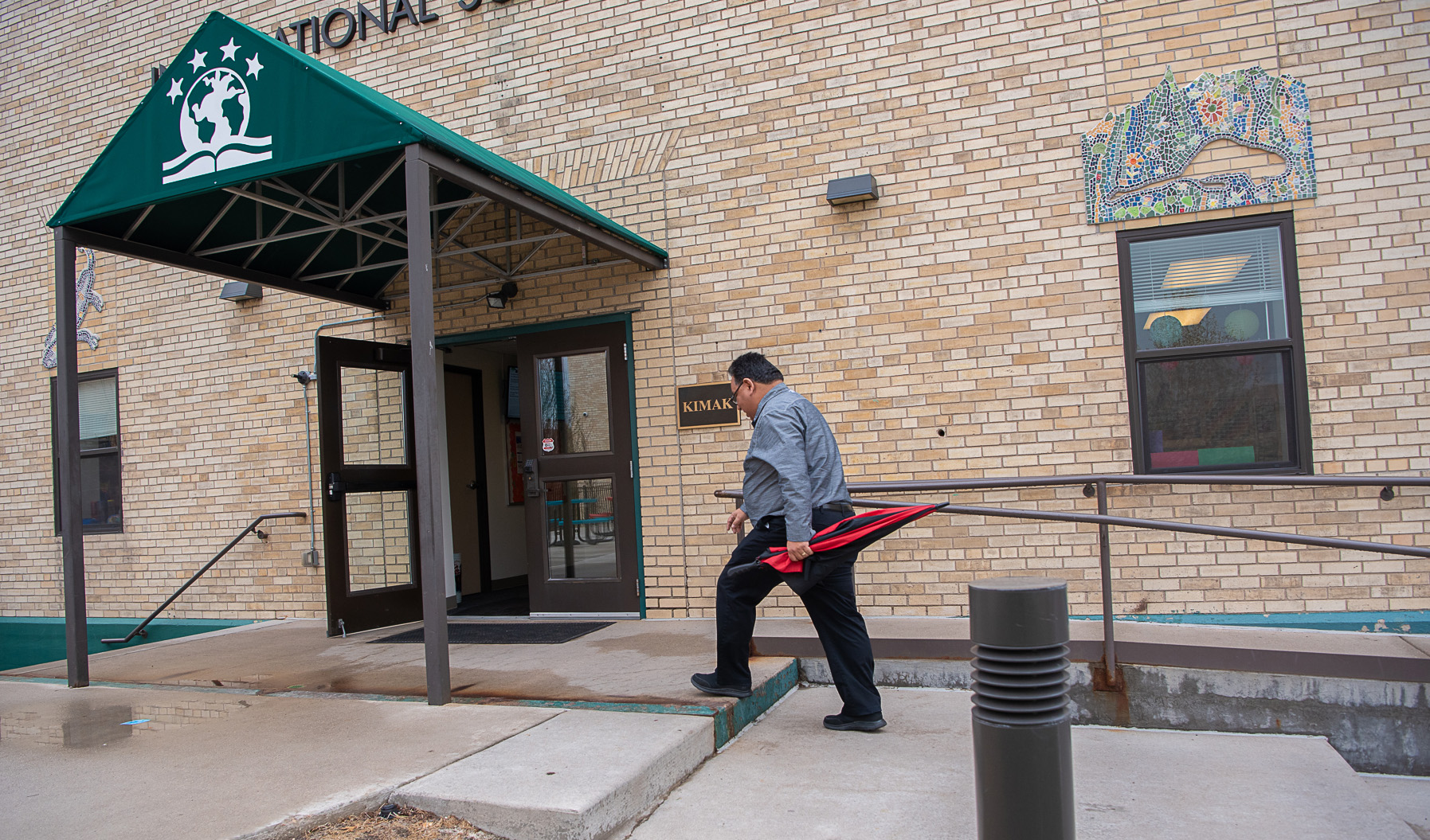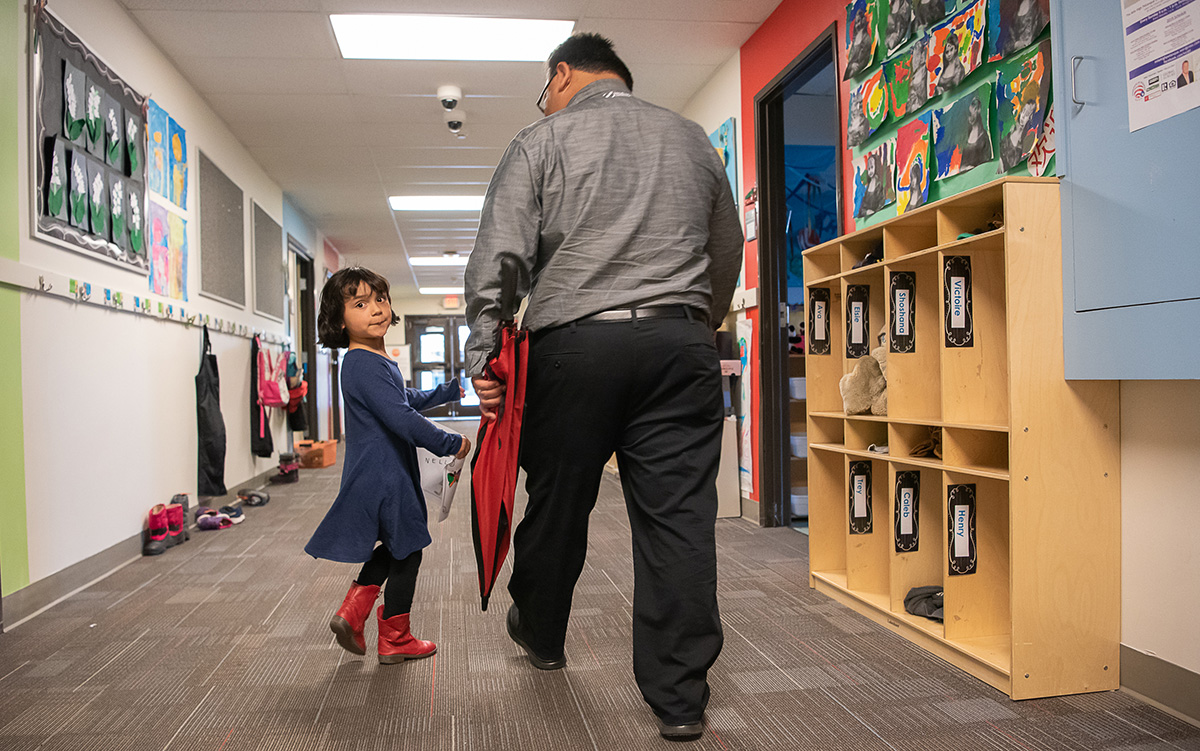Photo by Tanya Bylinsky Fabian
By Bruce Horovitz
After 20 years away from a college classroom, Robert Nuñez admitted he struggled when he started taking online classes toward a master’s degree in organizational leadership from Colorado State University-Global.
“Let’s just say, it took me a while to get back in the groove,” said Nuñez, 49, training manager for Haselden Construction, a large Denver-area construction company.
But with encouragement and financial backing from his employer, including a scholarship to fully cover his $6,000 tuition bill last year, Nuñez not only is an A student, he’s well on his way to obtaining a master’s degree that he views as an investment in himself and his company. After earning a bachelor’s degree in communication in the ’90s, his online graduate course work is helping Nuñez hone higher-level management skills to lead organizational change, establish employee policies, and analyze business budgets, among other responsibilities.
“It all comes down to looking for a way to improve my skills,” he said.

Welcome to CSU-Global employer partnerships. This 12-year-old program – an outgrowth of the university’s two dozen degree offerings – extends to more than 1,800 affiliated businesses and organizations across the country and includes partnerships with some of the largest employers in Metro Denver, including the state of Colorado, Comcast, and Wells Fargo. These employer partnerships go to the heart of CSU-Global’s mission of providing flexible, high-caliber, and affordable degree programs for nontraditional students – primarily working adults – who seek university education as a route to career advancement. The emphasis on career relevancy is equally critical for workforce development and a healthy economy.
For this reason, employer partnerships have grown in number and scope since CSU-Global launched in 2007 as the nation’s first fully online public university with accredited degree programs. Together, the partnerships contribute 15 percent of CSU-Global’s total student enrollment, or nearly 2,900 students of about 19,000 enrolled, said Travis Coufal, senior director of engagement at CSU-Global. Students who work for employer partners receive a 10 percent discount on tuition, which provides an incentive for education that is often immediately applicable to work.
All involved benefit. “The employee gets skills that can help them advance in their career. The employer gets a better-trained and more engaged employee, and CSU-Global gets to help more students,” Coufal noted. In fact, the three-way gains prompted CSU-Global to offer a variety of options for its organizational partners. For instance, the university provides customized training for businesses and their employees, designed to fulfill specific learning outcomes. In another aspect of this nimble, partner-based approach to higher education, CSU-Global works with businesses, community colleges, and many other affiliated organizations to help students easily transfer previously earned college credit to bachelor’s programs at the university.
The numbers bear out advantages: 94 percent of CSU-Global alumni said the program contributed to their professional goals; 25 percent of alumni reported receiving a promotion; and one in five said they received a pay increase within one year of graduation, Coufal said.

Ashley Rondon understands the benefits – and rigors – of the academic course work made possible through employer partnerships. Rondon, 32, is a registered nurse who oversees daily operations at a dialysis clinic in Tulsa, Oklahoma, and has three children age 5 and younger. As she manages a part-time job and caring for her young children, Rondon is motivated to advance in her career, hoping to become a dialysis facility manager. Such a career move could mean an annual salary jump of up to $20,000, she estimated.
And she has incentive beyond the bottom line. “I didn’t have strong female role models as a kid growing up, so I wanted to be that for my two girls,” Rondon said.
She’s pursuing a master’s degree in health care administration with support from her employer, DaVita, a health care company headquartered in Denver that is one of the nation’s largest operators of dialysis clinics for patients with kidney disease. DaVita picked up $3,000 of Rondon’s tuition costs this year, she said. That has significantly cut her expenses, allowing her to anticipate graduation in June 2020.
“I am very grateful to CSU-Global and the possibility for a busy, working mother of three small children to pursue my goals, dream big, and strive to be an example of strength, hard work, and perseverance for my children,” Rondon said. She typically studies starting at 9 p.m., after her kids are in bed; when she has a big paper due, her husband handles parenting while Rondon does course work at a local coffee shop.
Rondon learned about CSU-Global offerings through her employer, but sometimes it’s the other way around. Denver Health, one of the largest health systems in Metro Denver, discovered CSU-Global through employees who asked the organization to consider becoming an affiliate, said Rebecca Ellis, director of employee benefits at Denver Health.
Now, all employees are eligible for a 10 percent tuition discount, and Denver Health is exploring ways to deepen the partnership with CSU-Global, Ellis said. In addition to the tuition break, Denver Health reimburses qualified employees up to $2,700 for undergraduate course work through the university. Sixty-two employees are currently enrolled, she said.
Ellis said Denver Health has benefited from the academic studies of its employees. For example, one student-employee completed a public health capstone project that offered demographic insights into employee leave from work. “That ultimately helped us to identify a trend and to identify policies to help them return to work,” she said.
Tuition discounts that result from the partnership with CSU-Global are an attractive employee perk – especially important for Denver Health, a not-for-profit company that can’t usually pay wages above market rates, Ellis said. The 10 percent tuition discount ranks as a big employee benefit, she said, “and it didn’t cost the organization anything in hard dollars.”
Through its partnerships, CSU-Global also awards class credit for some on-the-job employee training. In fact, under certain rigorous training programs, student-employees may amass up to 21 class credits toward a bachelor’s degree; that can accelerate degree completion while further reducing costs for students, Coufal said.
For employers like Haselden Construction, the benefits of the CSU-Global partnership are realized on several levels – including, critically, employee retention. Beyond Nuñez, three other Haselden employees are taking CSU-Global classes as a result of the employer partnership. “Those of us in the program realize what a gift this is that our company has given us,” said Nuñez, who acts as a liaison between the organizations.
He hopes the knowledge he gains through his master’s program will “help grow my department and help this company become what it’s capable of becoming.” More broadly, the partnership between Haselden and CSU-Global fosters a culture of learning and training that helps the construction company compete, Nuñez said.
The program also has an imprint on a personal level, through its positive impact on the lives of student-employees. Nuñez sometimes studies with his 4-year-old daughter, Ella, sitting on his lap, a reminder of the ultimate incentive for learning. “It’s all about investing in yourself,” he said. “You never know what the future holds.”





